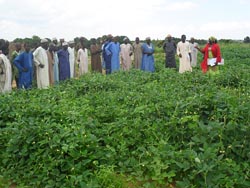In response to solving some of the challenges being faced by most farming households in Nigeria, International Institute of Tropical Agriculture and Catholic Relief Services signed a partnership agreement that provides mutual support and collaboration in the joint implementation of N2Africa and Feed the Future Nigeria Livelihoods Projects in FCT and Kebbi State.
|
The collaboration aims at increasing agricultural production and incomes and improving nutrition of farming households, with a focus on cowpea, groundnut and soyabean.
Photo: Participants at a cowpea demonstration site during Green field day at Ujariyo in Kebbi State |
 |
Through this collaboration, a lot of interventions have been made in the area of introducing improved varieties of these crops and improved agricultural farming practices. The N2Africa project provides support to promote new technologies and approaches to increase agricultural production while Feed the Future Nigeria Livelihoods Project provides the platform to reach out to beneficiaries. With this arrangement, both projects are able to meet their common objectives. To ensure quality program delivery, there is a joint monitoring approach of the field activities. This has already increased the project’s impact of on the beneficiaries within a short time.
In the first year of the collaboration, 136 producer groups with 4410 members (3549 male and 861 female) were reached. Six improved management practices including improved varieties, right spacing, seed treatment technology, use of hand-held planter, use of inoculant in soyabean and aflasafe in groundnut to prevent aflatoxin have been introduced to the farming communities through the establishment of 202 Demonstration Farms across project locations. More than 1,800 of the reached farming households have started adopting improved agronomic practices in production of cowpea, groundnut and soyabean. This is expected to translate into increased yield and income at the end of the current season. The project also introduced five high yielding, tolerant and disease resistant varieties of leguminous crops. To ensure that farmers have access to most of these introduced varieties within the communities in subsequent planting seasons, 107 community seed farms of approximately 0.5 ha/farm were established by trained seed entrepreneurs. Field days were conducted in all the 12 communities with 570 (Male-517, Female-53) farmers in attendance.
Besides introducing new technologies, the collaboration also has various other interventions to improve the agricultural production, incomes and nutrition of farming households. Agricultural trade and input voucher fairs were held in all the project locations. 446 vulnerable households were supported with input vouchers that covered up to 20% of the inputs required to cultivate 1 hectare of land. In addition, the capacity of 93 agro dealers was built in the area of effective handling of agro-chemicals and appropriate linkages with rural farmers. To avoid problems of marketing agricultural products with the anticipated increased agricultural output, marketing committees were formed in all the communities. Their task is to link producer groups to the target market. Field agents and lead farmers were trained on the use of non-chemical storage using triple bagging for cowpea (PICS bags) and use of locally fabricated groundnut oil processing machines. Farmers are continuously being encouraged to make use of PICS bags as this does not only reduce post-harvest losses but also removes the risk of contamination associated with the use chemical storage.
No doubt, collaboration work between N2Africa and Feed the Future Nigeria Livelihoods Project can be described as one of the collaborations that is achieving its goals of improving agricultural production, income and nutrition of farming households.
Charles Iyangbe (CRS), Nigeria
